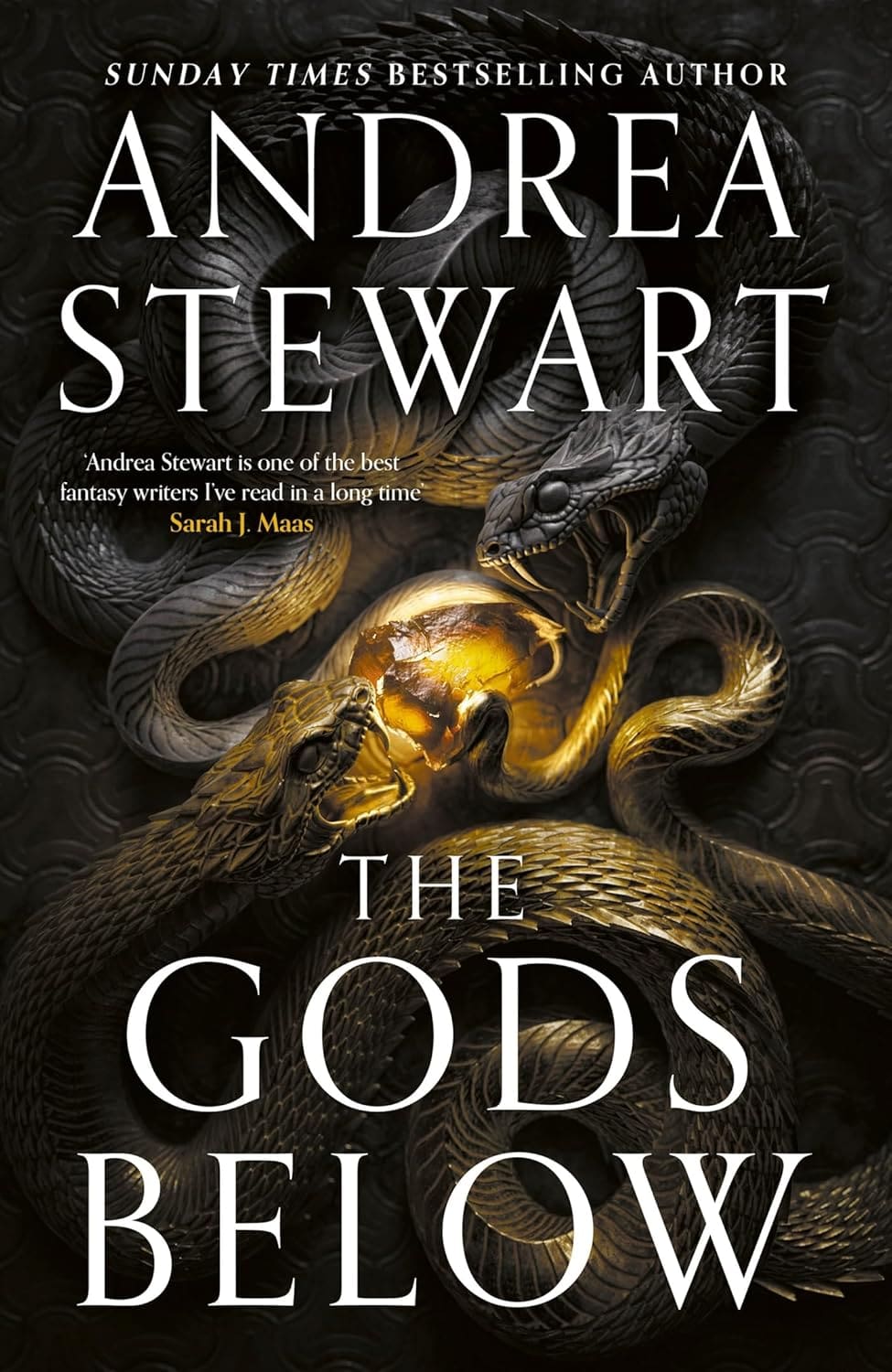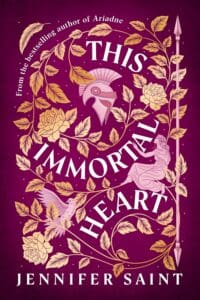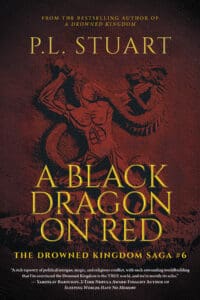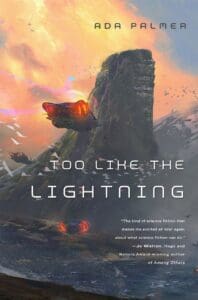
You come at the Gods, you best not miss
Synopsis
After a divine war shattered the world, humanity struck a pact with the god Kluehnn: in return for regular tribute of magical gems, Kluehnn would restore the world to its former glory. But as each land is transformed, so too are its people changed into strange new forms – if they survive at all.
Hakara is not willing to pay such a price. Desperate to protect herself, and her sister Rasha, she flees her homeland for the safety of a neighbouring kingdom. But tragedy strikes when they’re separated, and Hakara is forced to abandon Rasha to an unknown fate.
Yet when Hakara discovers she can channel the power of the magical gems, she’s invited to join a clandestine plot to destroy the God Pact. To win Hakara to their cause, the conspirators reveal a startling secret: Rasha is alive – and they can help rescue her.
But only if Hakara goes to war against a god.
Review
In her first series The Drowning Empire, the epic fantasy trilogy more obsessed with bones than a dinosaur documentary, Andrea Stewart showcased her vivid, imaginative worldbuilding; a multi-layered magic system that kept on giving; and her gift for addictive, instantly compelling characterisation. With The Gods Below, the first book in her new series The Hollow Covenant, Stewart has taken this formula and cranked it up to 11, and the result is a stunningly ambitious book that had me completely absorbed from start to finish, albeit when you try to explain it, it sounds like you’ve fallen asleep on the couch after guzzling too many strange-coloured mushrooms your friend brought back from the fairy forest.
But I’ll try anyway… the story takes place in a world which mortals almost ruined by leeching the magic from it to power their technology. Luckily, one of the gods, a cunning fellow called Kluehnn, stepped in and made a pact: he’d restore their ruined world, but at a price: each kingdom he restores, half the population is killed to power the restoration and the other half are “altered” into beasts of the horned, winged and rocked varieties, monstrous versions of their former human selves. Meanwhile, the non-restored kingdoms nervously await their time as one by one the lands fall to the restoration, blocked off from their neighbors by virtually impassible poison magic barriers. Oh and while they’re waiting to find out if they’ll be god juice or a creepy monster, they must mine special-powered “god gems” out of the earth, dodging dangerous magical gas, while Kluehnn’s lethal god killers roam the lands killing off the remaining gods.
I haven’t even scratched the surface of this plot and as you can see, it is A LOT. Readers who remember the fairly calm start to The Bone Shard Daughter, book 1 of her previous trilogy (albeit there was a sinking island) will not be at all ready for the start of this one, in which two sisters are in a race against time to escape the rushing black wall of death as a new land faces restoration. From there it hardly ever lets up. The first third is pacy action mixed with worldbuilding revelation after worldbuilding revelation. Just as you think you get a hang on the world, another layer is revealed. And you know what? It works. It works well. Partly because it is fascinating, so wildly alien in some parts, and partly because the secret to Stewart’s books is that everything, no matter how wild the magic system or worldbuilding, is always anchored to the characters.
And, just like her previous series, the characters here are addictively, compellingly brilliant. Stewart has a knack, which is rarer than you think in fantasy, of instantly making you care about a character. Such is the way with the 5 POVs – yes 5, Stewart is continuing her POV juggling act and as a writer with way too many POVs of my own I heartily approve – in this book. One character is desperate to save her sister, cruelly separated from her in one of the “restorations”. Sympathetic. Another is trying to navigate a long lost path down to the gods. Put it straight in my veins. Another is forced into some kind of Hunger Games-style battle to be the best assassin in town. Hell yeah. These instantly absorbing character arcs get increasingly complex as their motivations are nuanced by romance, political motivations, duty and betrayal – but they never get less than incredibly compelling. My favourite was Sheuan, the marvellously cunning and Machiavellian manipulator of people who you constantly root for despite being the most morally grey of them. But I loved them all – I was never disappointed to switch POV – and that is the sign of a fantasy writer for whom character is front and centre.
Another Stewart skill is that brilliant fantasy trope of presenting the world and then slowly peeling it back only to realise that you knew nothing; nothing about the magic system, nothing about the world. Though there’s clearly many more secrets to come in books 2 and 3, we already get some peeling behind the curtain here, and it’s a devastatingly clever act. This is a land of mysteries wrapped in secrets wrapped in you know nothing, Jon Snow. It’s why Stewart’s fantasy appeals to me so much, I think; that hit you get from a Robin Hobb or Mark Lawrence of secrets behind secrets.
It’s also worth saying how deliciously dark this is, more so than her previous series. This should go without saying given that the basic plot is hinged on the premise of regular massacres of 50% of a kingdom’s population and the removal of the humanity of the rest – don’t think about it too long because it gets worse the more you ponder it – but the darkness continues throughout, with horrific killings and delicious dark detail. It’s not quite grimdark, but it is as dark as non-grimdark epic fantasy ever gets, and this allows Stewart to really dig deep into some fascinating themes, such as the cost to kingdoms of being cut off from each other, emphasised by the alien-looking nature of those who manage to mix with mortals. Living in a continent that feels increasingly suspicious of each other and reluctant to take in outsiders, I feel the timely chill of these themes of unity versus nationalism over my shoulder. There are also fascinating themes of propaganda and how easily manipulated a world can be by seemingly incomprehensible forces. Read into that what you will – Stewart’s themes are more hinted at than slapped in your face – but it makes this a fun book to decipher.
Finally I have to mention the romance element. As you’d expect with a Stewart series there are engaging romance plots both straight and queer, but these are heightened in this series by the, uh, inter species possibilities presented by mortals getting together with the beast-like “altered”. I’ve always been completely convinced by Stewart’s romance writing, and here every single (potential) coupling feels complex and real and fierce.
Overall, the Gods Below offers insanely ambitious worldbuilding and some of the best character arcs in fantasy… Andrea Stewart is back, and it’s time to get obsessed again.









Leave a Reply